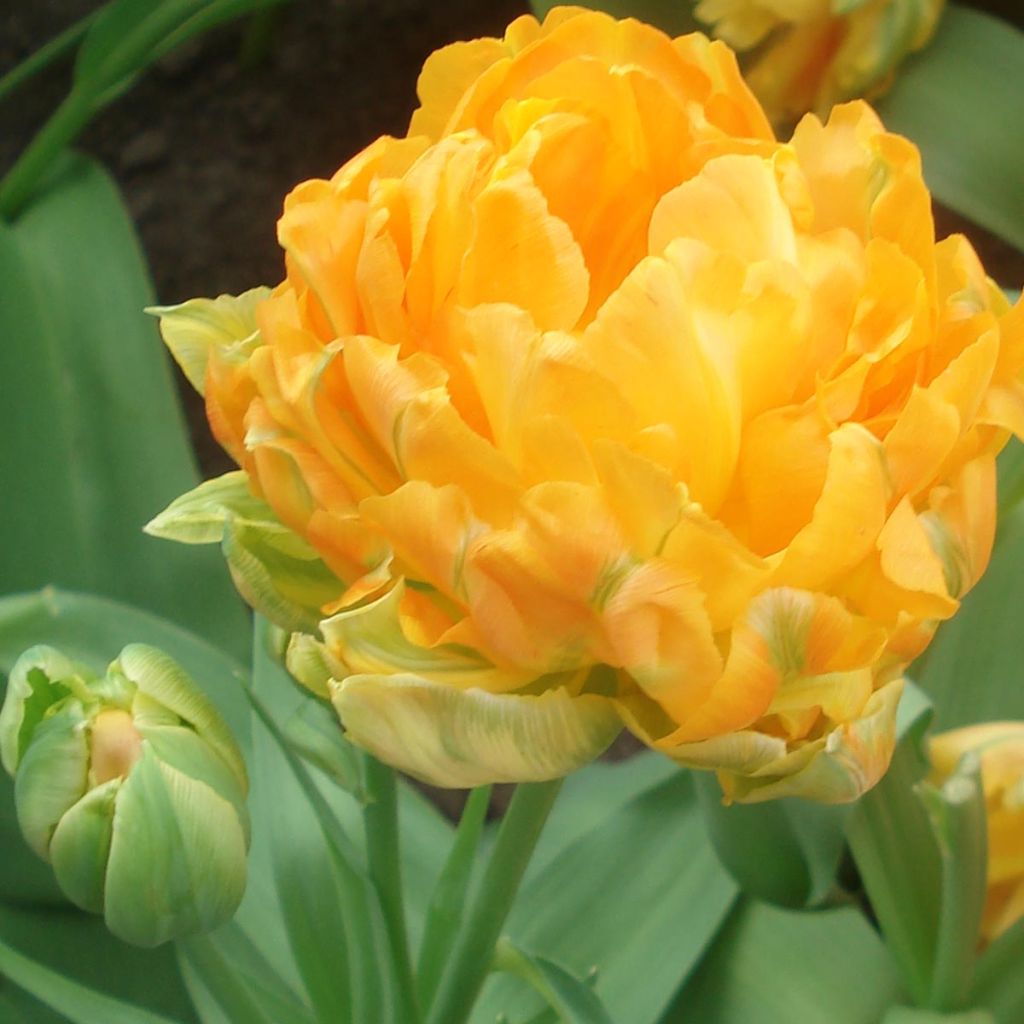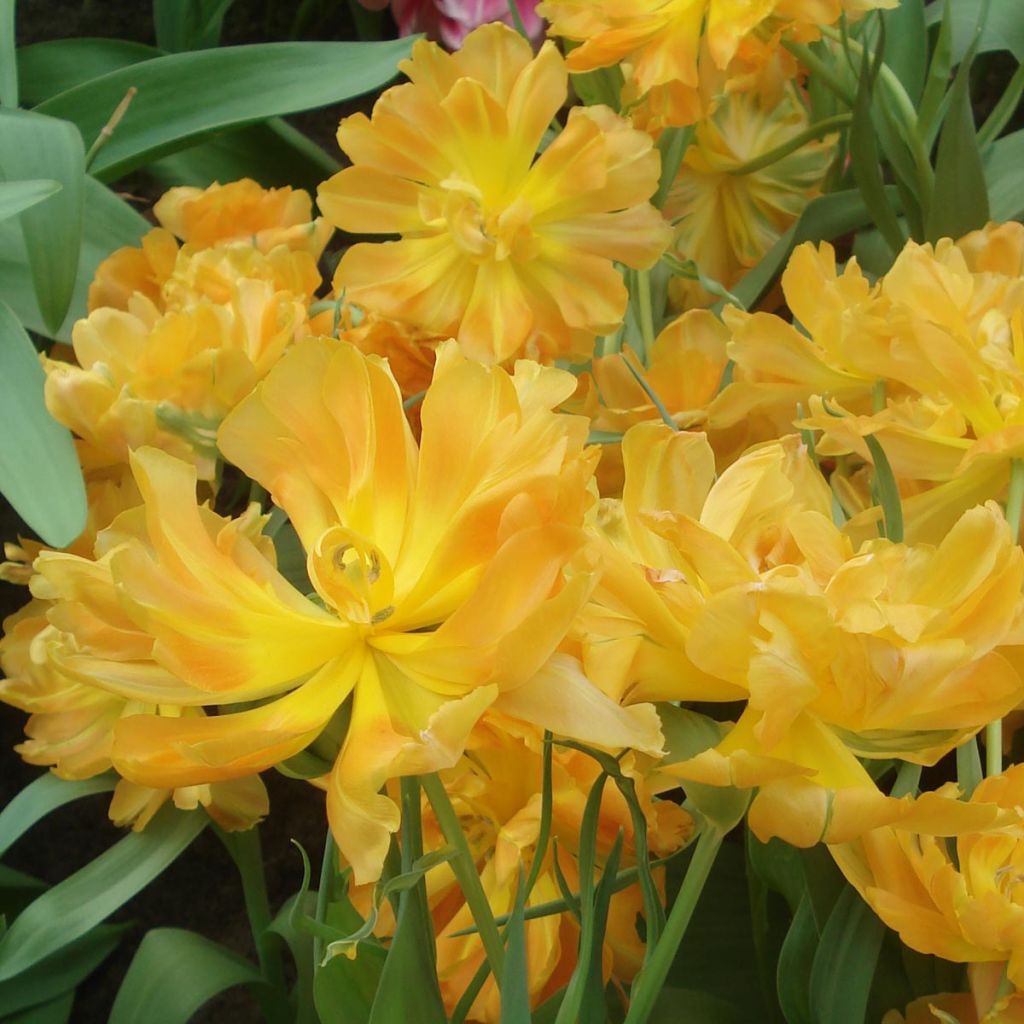

Tulipe double Orca


Tulipe double Orca
Tulipa Orca
Tulipa Orca
Tulip
This has nothing to do with Orca. I've had them for 3 years, and this time it looked like plain, dull, double orange tulips, nothing like Orca.
elisabeth, 22/04/2024
This plant carries a 6 months recovery warranty
More information
We guarantee the quality of our plants for a full growing cycle, and will replace at our expense any plant that fails to recover under normal climatic and planting conditions.
From €5.90 for pickup delivery and €6.90 for home delivery
Express home delivery from €8.90.
Does this plant fit my garden?
Set up your Plantfit profile →
Description
The 'Orca' Early Double Tulip is a variety widely used for cut flowers. The colour of the flower changes as it blooms, evolving from pale honey to almost mandarin orange as it opens up like a water lily. It also has a very pleasant fragrance. Blooms brightly in April-May. Perfect for bouquets.
The 'Orca' Tulip belongs to the Lily family. Originally a horticultural species, it is now classified in the group of 'Early Doubles', which are characterised by flowering at approximately the same height. 'Orca' is a sport of the famous 'Monte Carlo' Tulip and reaches a height of 45 cm (18in) when in bloom. Perched on stems well above the broadly lanceolate leaves, the flowers are fully double, fragrant, open cup-shaped, and long-lasting. Flowering takes place in April-May, in the heart of the tulip season.
Plant the bulbs in autumn, from September to December, at a depth of 15 cm (6in), 10 cm (4in) apart in ordinary, slightly acidic, neutral, or slightly alkaline, loose, well-worked, and well-draining soil. Never add poorly decomposed manure or compost to the planting soil, as this could cause the bulbs to rot. The 'Orca' tulip thrives in moist to dry soil, in a sunny or semi-shaded location. After flowering, it is best to remove the seed heads to prevent the plant from becoming exhausted.
Double early tulips are popular for their wide range of colours and sturdy and resistant flowers, suitable for flower beds and bouquets. They are among the most widely planted varieties, unmatched for bringing spring colours to pots or sunny gardens. Remember to consider height and flowering period when designing your flower beds, as these parameters can vary significantly from one cultivar to another. It is a good idea to plant a few extra bulbs for beautiful long-lasting cut flowers. 'Orca' is a good cultivar for winter forcing, making it ideal for creating lovely bouquets to give on Valentine's Day.
About botanical species: Tulip species are found in most parts of the Old World, from Western Europe to China and Japan, through Eastern Europe, Asia Minor, and Central Asia. Their distribution area also includes North Africa and the Indian subcontinent. The centre of diversity for the genus is in the Pamir and Hindu Kush mountains and the steppes of Kazakhstan.
There are various wild species, many of which are endangered. They are either large tulips found in cultivated fields, the most well-known being the Agen Tulip (Tulipa agenensis), or small tulips found in wooded areas or among rocks in the mountains. In cultivation, these are called "botanical tulips," and one of the most common is the Wild Tulip (Tulipa sylvestris), which often used to grow sheltered by vines and whose subspecies australis is known as the Southern Tulip.
Report an error about the product description
Plant habit
Flowering
Foliage
Botanical data
Tulipa
Orca
Liliaceae
Tulip
Cultivar or hybrid
Planting and care
Plant the bulbs in autumn, from September to December, at a depth of 15 cm (6in), 10 cm (4in) apart in ordinary, slightly acidic, neutral, or slightly alkaline, loose, well-worked, and well-drained soil. Never add manure or poorly decomposed compost to the planting soil, as this could cause the bulbs to rot. The 'Orca' tulip will thrive in moist to dry soil, in a sunny or partially shaded location. Once flowering is complete, it is best to remove the seed heads to avoid exhausting the plant.
Planting period
Intended location
Care
-
, onOrder confirmed
Reply from on Promesse de fleurs
Haven't found what you were looking for?
Hardiness is the lowest winter temperature a plant can endure without suffering serious damage or even dying. However, hardiness is affected by location (a sheltered area, such as a patio), protection (winter cover) and soil type (hardiness is improved by well-drained soil).

Photo Sharing Terms & Conditions
In order to encourage gardeners to interact and share their experiences, Promesse de fleurs offers various media enabling content to be uploaded onto its Site - in particular via the ‘Photo sharing’ module.
The User agrees to refrain from:
- Posting any content that is illegal, prejudicial, insulting, racist, inciteful to hatred, revisionist, contrary to public decency, that infringes on privacy or on the privacy rights of third parties, in particular the publicity rights of persons and goods, intellectual property rights, or the right to privacy.
- Submitting content on behalf of a third party;
- Impersonate the identity of a third party and/or publish any personal information about a third party;
In general, the User undertakes to refrain from any unethical behaviour.
All Content (in particular text, comments, files, images, photos, videos, creative works, etc.), which may be subject to property or intellectual property rights, image or other private rights, shall remain the property of the User, subject to the limited rights granted by the terms of the licence granted by Promesse de fleurs as stated below. Users are at liberty to publish or not to publish such Content on the Site, notably via the ‘Photo Sharing’ facility, and accept that this Content shall be made public and freely accessible, notably on the Internet.
Users further acknowledge, undertake to have ,and guarantee that they hold all necessary rights and permissions to publish such material on the Site, in particular with regard to the legislation in force pertaining to any privacy, property, intellectual property, image, or contractual rights, or rights of any other nature. By publishing such Content on the Site, Users acknowledge accepting full liability as publishers of the Content within the meaning of the law, and grant Promesse de fleurs, free of charge, an inclusive, worldwide licence for the said Content for the entire duration of its publication, including all reproduction, representation, up/downloading, displaying, performing, transmission, and storage rights.
Users also grant permission for their name to be linked to the Content and accept that this link may not always be made available.
By engaging in posting material, Users consent to their Content becoming automatically accessible on the Internet, in particular on other sites and/or blogs and/or web pages of the Promesse de fleurs site, including in particular social pages and the Promesse de fleurs catalogue.
Users may secure the removal of entrusted content free of charge by issuing a simple request via our contact form.
The flowering period indicated on our website applies to countries and regions located in USDA zone 8 (France, the United Kingdom, Ireland, the Netherlands, etc.)
It will vary according to where you live:
- In zones 9 to 10 (Italy, Spain, Greece, etc.), flowering will occur about 2 to 4 weeks earlier.
- In zones 6 to 7 (Germany, Poland, Slovenia, and lower mountainous regions), flowering will be delayed by 2 to 3 weeks.
- In zone 5 (Central Europe, Scandinavia), blooming will be delayed by 3 to 5 weeks.
In temperate climates, pruning of spring-flowering shrubs (forsythia, spireas, etc.) should be done just after flowering.
Pruning of summer-flowering shrubs (Indian Lilac, Perovskia, etc.) can be done in winter or spring.
In cold regions as well as with frost-sensitive plants, avoid pruning too early when severe frosts may still occur.
The planting period indicated on our website applies to countries and regions located in USDA zone 8 (France, United Kingdom, Ireland, Netherlands).
It will vary according to where you live:
- In Mediterranean zones (Marseille, Madrid, Milan, etc.), autumn and winter are the best planting periods.
- In continental zones (Strasbourg, Munich, Vienna, etc.), delay planting by 2 to 3 weeks in spring and bring it forward by 2 to 4 weeks in autumn.
- In mountainous regions (the Alps, Pyrenees, Carpathians, etc.), it is best to plant in late spring (May-June) or late summer (August-September).
The harvesting period indicated on our website applies to countries and regions in USDA zone 8 (France, England, Ireland, the Netherlands).
In colder areas (Scandinavia, Poland, Austria...) fruit and vegetable harvests are likely to be delayed by 3-4 weeks.
In warmer areas (Italy, Spain, Greece, etc.), harvesting will probably take place earlier, depending on weather conditions.
The sowing periods indicated on our website apply to countries and regions within USDA Zone 8 (France, UK, Ireland, Netherlands).
In colder areas (Scandinavia, Poland, Austria...), delay any outdoor sowing by 3-4 weeks, or sow under glass.
In warmer climes (Italy, Spain, Greece, etc.), bring outdoor sowing forward by a few weeks.



































